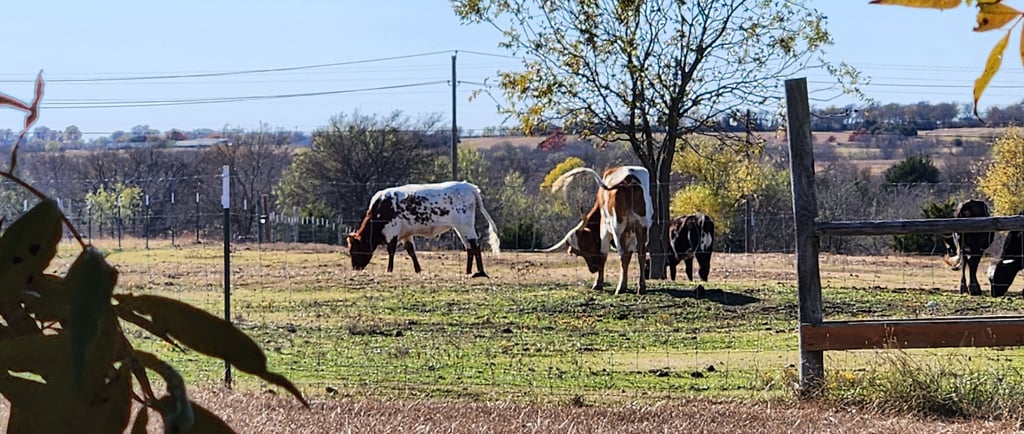Miniature Cattle Can help save money
How Miniature Texas Longhorns can help small acreage farms/ranches save on property taxes.
4/13/20254 min read


Small Hooves, Big Potential Savings:
Understanding Agricultural Valuations and How Miniature Cattle Can Help
For landowners dreaming of lower property taxes, the concept of an "agricultural exemption" is often appealing. While the term "exemption" isn't always accurate – it's frequently a special agricultural valuation that lowers your property tax burden – the financial relief can be significant. These valuations recognize the importance of agricultural land use. Miniature cattle, with their smaller size and needs, can be a valuable tool in meeting the criteria, especially for smaller properties.
It's crucial to understand that agricultural valuation requirements vary dramatically by state and even by your specific county. This blog will explore how miniature cattle can contribute to qualifying, but always consult your local authorities for precise regulations.
Understanding Agricultural Valuations (Often Mislabeled as Exemptions):
Instead of a complete exemption from property taxes, many jurisdictions offer a special valuation for land actively used for a bona-fide agricultural purposes. This means your land is taxed based on its agricultural productivity rather than its potential market value for development. Additionally, sales tax exemptions on specific agricultural supplies and equipment may be available, typically for items directly used in producing agricultural goods for sale.
Qualifying for agricultural valuation generally involves demonstrating:
Minimum Acreage (Varies Significantly): Your state and county will have specific minimum land size requirements, which can differ based on the type of agricultural activity.
Active Agricultural Use: The land must be actively used for activities like raising livestock, growing crops, or other agricultural production common in your region. This requires more than just owning animals; it involves active management.
Intensity of Use: Authorities often look for an "intensity" of agricultural use typical for your area. This might involve specific stocking rates (number of animals per acre) or cultivation practices.
Intent for Agricultural Use (May Include Income Potential): While not always a strict income requirement for property valuation, demonstrating a genuine intent to use the land for agriculture is key. For sales tax exemptions, the intent to sell agricultural products is usually necessary.
Adherence to Sound Agricultural Practices: Implementing responsible land and animal management practices is generally expected.
The Miniature Cattle Advantage: Aiding Qualification on Smaller Acreage
Miniature cattle offer unique benefits that can make achieving agricultural valuation more feasible, particularly on smaller properties:
Potentially Lower Acreage Requirements: Due to their reduced grazing needs and smaller size, you can often maintain a qualifying number of miniature cattle on less land compared to standard-sized breeds. This opens the door to agricultural valuation for properties that might not otherwise meet livestock density requirements with traditional cattle.
Reduced Impact on Pasture: Their lighter weight and lower forage consumption mean less risk of overgrazing, helping you maintain healthy land and meet the requirements for responsible land management.
Manageable Investment and Operational Costs: The initial purchase price and ongoing costs of feeding and caring for miniature cattle can be lower, making agricultural endeavors more accessible financially.
Diverse Agricultural Applications: Miniature cattle can contribute to meeting valuation criteria through various activities:
Breeding and Sales: Selling registered miniature cattle can demonstrate agricultural purpose and potentially generate income.
Small-Scale Dairy (Specific Breeds): Breeds like Miniature Jerseys can provide milk for personal use or small-scale sales.
Land Management: Their grazing can help manage vegetation and maintain open land.
Educational Opportunities: Hosting farm visits or workshops can showcase agricultural activity.
Niche Market Potential: Products from miniature cattle (meat, milk, breeding stock) can tap into specialized markets, potentially aiding in demonstrating an intent to derive income.
Crucial Considerations and Resources:
While miniature cattle can be advantageous, remember these vital points:
Local Regulations are Paramount: Always, always verify the specific requirements for agricultural valuation in your state and, most importantly, your county.
Contact your County Appraisal District or Tax Assessor-Collector for accurate information, applications, and deadlines.
Demonstrate Active Agricultural Use: Owning miniature cattle alone is unlikely to qualify you. You must actively manage them and the land according to accepted agricultural practices in your area. Keep detailed records of your activities, expenses, and any income.
Sales Tax Exemptions Have Specific Rules: If you're seeking sales tax exemptions on agricultural supplies, contact your State's Department of Revenue or Taxation for regulations and required forms. These exemptions typically apply to items used directly and exclusively in producing agricultural goods for sale.
Understand "Rollback Taxes": Be aware that if you receive an agricultural valuation and later change the land's use to non-agricultural purposes, you may be subject to rollback taxes, which can recoup the tax savings from previous years, often with interest.
Miniature Cattle are an option, Not a Guarantee: They can help you meet requirements, especially on smaller acreage, but they don't automatically grant agricultural valuation. All other local criteria must still be met.
Where to Find Accurate Information:
Your County Appraisal District or Tax Assessor-Collector: This is your primary resource for property tax valuation requirements, applications, and local guidelines. Search online for their official website.
Your State's Department of Agriculture: Provides general information on agricultural practices and may have links to relevant state laws. Look for their official website.
Your State's Department of Revenue or Taxation: Offers details on sales tax exemptions for agricultural inputs, including regulations and application processes. Find their official website.
Agricultural Extension Offices (Associated with State Universities): These local offices provide valuable educational resources on livestock management and land use practices relevant to your area. Search for your state's extension service online.
Miniature Cattle Breed Associations: Organizations like the Miniature Hereford Breeders Association or the American Dexter Cattle Association offer breed-specific information and resources.
Legal Professionals Specializing in Agricultural Law: For complex situations or personalized legal advice, consider consulting an attorney specializing in agricultural law in your state.
Please remember that the information provided in this blog post is for general informational purposes only and does not constitute legal or financial advice. Agricultural valuation laws and regulations vary significantly by location. Always consult with your local county appraisal district or tax assessor-collector and relevant state agencies for the most accurate and up-to-date information specific to your situation.


